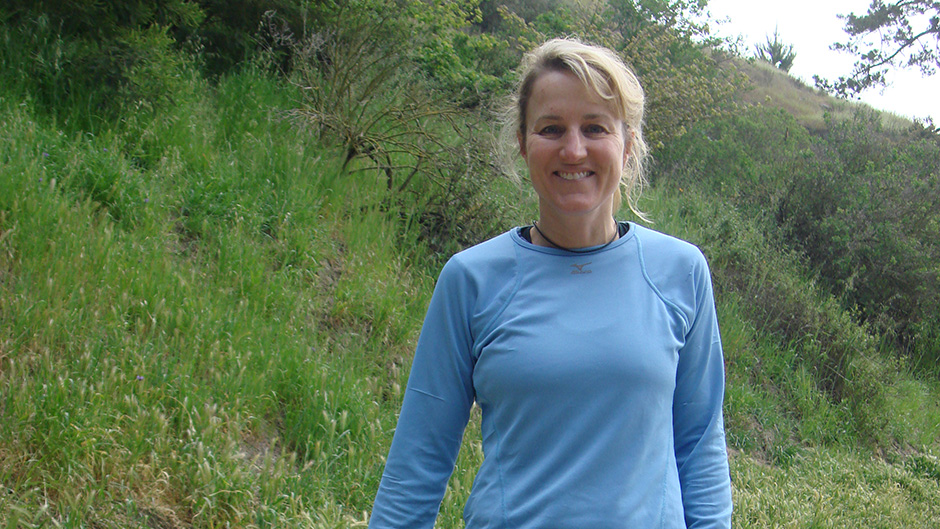Everything about Tamara (rhymes with CAMERA) Rice Lave is fast—when she is excited about a subject, the words come flying out like a swarm of bees on Red Bull; she is fleet of feet, having represented the U.S. in the marathon at the 2003 Track and Field World Championships in Paris; and is a chop-chop decision-maker, thanks to learning cost-benefit analysis early in life from her economist parents.
Perhaps because she grew up with a twin brother (who with dark hair and dark eyes always insisted she was adopted) Lave developed a powerful competitive streak. She does nothing by halves. Ask her a question about an obscure criminal case and she will have, in no time at all, the case, an opinion, and will often have already spoken with the attorneys involved.
As the daughter of two professors, Lave always wanted to be an academic. The pursuit took her from Haverford College, where she earned a B.A. in philosophy, to Stanford Law School. Then, after a 10-year stint at the San Diego County Public Defender's Office, she continued her academic journey at the University of California, Berkeley, where she earned a Ph.D. in Jurisprudence and Social Policy.
"As a very little kid, teaching always looked like the best job. My parents were really happy. They loved what they did. It was truly interesting," she said. "I remember in sixth grade, sitting on the end of a diving board and saying, 'I want to get my Ph.D. at this age, get married at that age, be a professor at another age'—it was all mapped out. It always seemed like the best job in the world, and it is."
Lave took a couple of side trips along the way. She taught 10th and 11th grade A.P. English at the American School of Guatemala and volunteered at Casa Alianza Orphanage in Guatemala City helping girls transition from street life to stability. She returned to Guatemala after her first year of law school and worked with Casa Alianza's Legal Aid office, documenting and disseminating how it had achieved its groundbreaking victory in holding the Guatemalan police accountable for murder. She also worked as a reporter for the Prague Post and Prognosis newspapers in the Czech Republic, and until recently wrote a monthly column, "The Runner's Witness", forRunning Times magazine.
Although Lave always knew she wanted to be a professor, she wasn't sure at first what she wanted to study and teach. "I remember walking with my dad and talking about studying theory and how to make a tangible difference. Law school seemed more in the world than being a philosophy professor. I thought it would be a better bridge between theory and practice."
But always there was running: "We started running when we were very little," Lave said. "My dad would run every day, and we would run to the end of the street and wait for him to come back again. We would imitate him doing his exercises, and before first grade, we were running and exercising every morning.
"The first race I ran in was in sixth grade," she said, "and it was a county-wide cross country race. I came in third place. Everyone was really surprised because I was never really that fast. But running, like many things in life, is something where if you do it every day, you will get stronger and faster. Running has always been incredibly important to me."
The other theme that runs through Lave's life is dogs. Her father, after extensive cost-benefit analysis when the twins were 18 months old, determined that standard poodles were the dog for them because they were smart and didn't shed. "My parents brought us to this place with standard poodle puppies and just put us in the crate and watched until they had found the friendliest one." And so began Lave's love affair with big, bouncy dogs. The latest of the legacy: Rodeo—a Texas-born, 70 lb., spring-loaded, black Labradoodle, who spends as much time roaming the halls of Miami Law as the professor who cares for him.
Both have found a home, as well as an addition. On September 30th, Lave gave birth to Atalanta, a beautiful baby girl, already with the long lean look of a world class runner.
Lave may have the looks of a quintessential California surfer girl, the feet of a runner, and a heart for dogs and, now child, but at the end of the day she is all criminal law professor.
"The best part of being a public defender is doing the closing argument. That is when all the facts are in, you don't have to freak anymore about a witness going sideways, or some new piece of evidence; it's just you spinning your argument and trying to be as persuasive as possible," she said. "With teaching, I think every class is a bit like doing a closing argument. You want to put on a good show and be fun and exciting and all those kinds of things, but the enterprise of what you are trying to do as a teacher is very different. Instead of trying to get the students to see things in one particular way that benefits your client, you are trying to get them to see things in a way they've never thought about before, to understand the world in a way they didn't previously, to flourish and leave your class, and be more aware, more critical, and more insightful."

